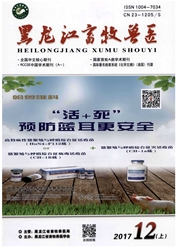

 中文摘要:
中文摘要:
为了解新疆阿克苏地区猪戊型肝炎病毒的感染状况,采用酶联免疫吸附试验(ELISA)对采自新疆阿克苏地区8县1市的1 660份猪血清进行戊型肝炎病毒Ig G抗体检测,采用逆转录套式聚合酶链式反应(reverse transcription nested polymerase chain reaction,RT-n PCR)对采集的100份猪粪便进行戊型肝炎病毒RNA检测。结果表明:所检测血清总的抗体阳性率为53.25%(884/1 660);8县1市采集样品的抗体阳性率依次为58.00%(116/200)、45.56%(82/180)、62.50%(75/120)、65.77%(171/260)、55.63%(89/160)、46%(184/400)、42.00%(42/100)、50.00%(45/90)、53.33%(80/150);粪便样品中没有检测到戊型肝炎病毒RNA。说明新疆阿克苏地区猪戊型肝炎病毒感染比较普遍,应当引起有关部门的高度重视。
 英文摘要:
英文摘要:
To understand the status of swine hepatitis E virus (HEV) infection in Aksu region of Xinjiang, 1660 swine ser collected at 8 coun- ties and 1 city of Aksu region in Xinjiang, were tested for the presence of IgG antibodies against HEV using nzyme - linked immunosorbent as- say (ELISA). 100 copies of swine feces were detected for the presence of HEV RNA using nested polymerase chain reaction. The result showed that the overall antibody positive rate was 53.25% (884/1660) in all detected serum samples, and the antibody positive rates of serum samples collected from the 8 counties and 1 city were follows as: 58.00% ( 116/200), 45.56% (82/180), 62.50% (75/120), 65.77% ( 171/ 260), 55.63% (89/160), 46% (184/400), 42.00% (42/100), 50% (45/90), and 53.33% (80/150). All fecal samples were nega- tive for HEV RNA. The results indicate that swine HEV infection is relatively common in Aksu region of Xinjiang, which should be paid high attention by the department concerned.
 同期刊论文项目
同期刊论文项目
 同项目期刊论文
同项目期刊论文
 期刊信息
期刊信息
